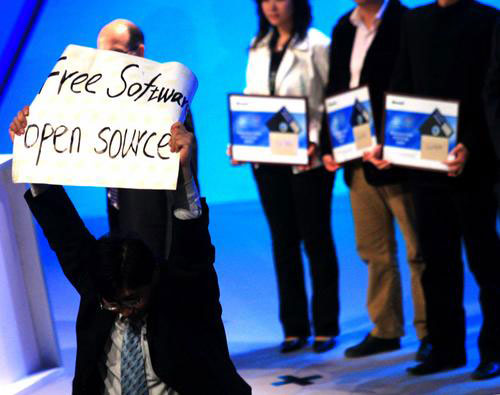I’ve always been suspicious of the big consultancy firms. When I worked on a project in Whitehall some years ago, I watched a team from one of the major outfits at work. An ultra-cautious, ass-covering junior minister was required to make a decision about a project. Rather than ask hard questions himself, he ordered an investigation by a Big Consultancy Firm. The firm sent in a squad of sharp-suited kids who went around asking silly questions for a week and then produced a stupefyingly obvious PowerPoint presentation which told the minister what he wanted to hear. The bill for this hogwash came to £70k. The minister thought it was good value because (a) it wasn’t his money, and (b) it provided him with a document he could wave at the Public Accounts Office if any questions were subsequently raised about the decision. The whole thing was astonishingly cynical, unprofessional and shoddy.
Now comes an interesting report from Information Week about allegations contained in lawsuits filed last week in an Arkansas federal court by the US Department of Justice. The complaints claimed the defendants — companies like Sun, HP and Accenture — paid or received kickbacks from dozens of companies in violation of federal law, while denying that they had such arrangements.
Accenture figures prominently in the government’s complaints.
While Sun and HP allegedly paid millions of dollars each year in kickbacks, Accenture allegedly accepted them in the form of “system integrator compensation,” rebates, and marketing assistance fees. The company earned all three from Sun and HP, according to the complaint.
As a consultant for the government, Accenture was hired as an objective adviser in choosing vendors and purchasing IT equipment, software, and services. The government, however, says Accenture and its purchasing subsidiary, Proquire, were less concerned with their client, and more interested in profits and revenue from partners. “As a result, millions of dollars of kickbacks were sought, received, offered, and paid between and among the defendants with the alliances in violation of the False Claims Act and other federal statutes and regulations,” the complaint said.
Between 1998 and 2006, Accenture earned more than $4 million in cash from system integrator compensation, the complaint said. Between 2001 and 2006, Accenture received such fees from EMC, HP, IBM, Informatica, Mercury Interactive, NCR, PeopleSoft, and Sun. With the exception of Sun and HP, none of the other companies are accused of any wrongdoing.
Accenture also received rebates and marketing assistance fees that were based on a percentage of the revenue in reselling partners’ hardware, software, and services. Under government regulations, such rebates or fees should be pass on to the government.
Accenture, for example, earned more than $32,000 in rebates from HP in July 2002, and more than $2 million in marketing assistance fees between 2003 and 2005 from Sun, according to the complaint.
Without telling the government, Accenture also negotiated steep discounts on hardware, software, and services, and then sold them to the government at higher prices. “Accenture personnel were instructed to constantly look for ways to structure government contract transactions so as to provide for greater opportunities to maximize resale revenue often at the direct expense of its government clients,” the complaint said.
Thanks to Nick Carr and Bill Thompson for alerting me to this particular example of ingenious consultancy ‘services’.




